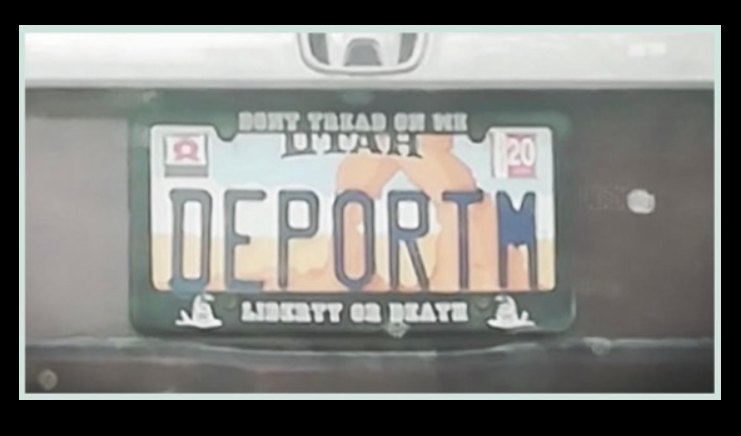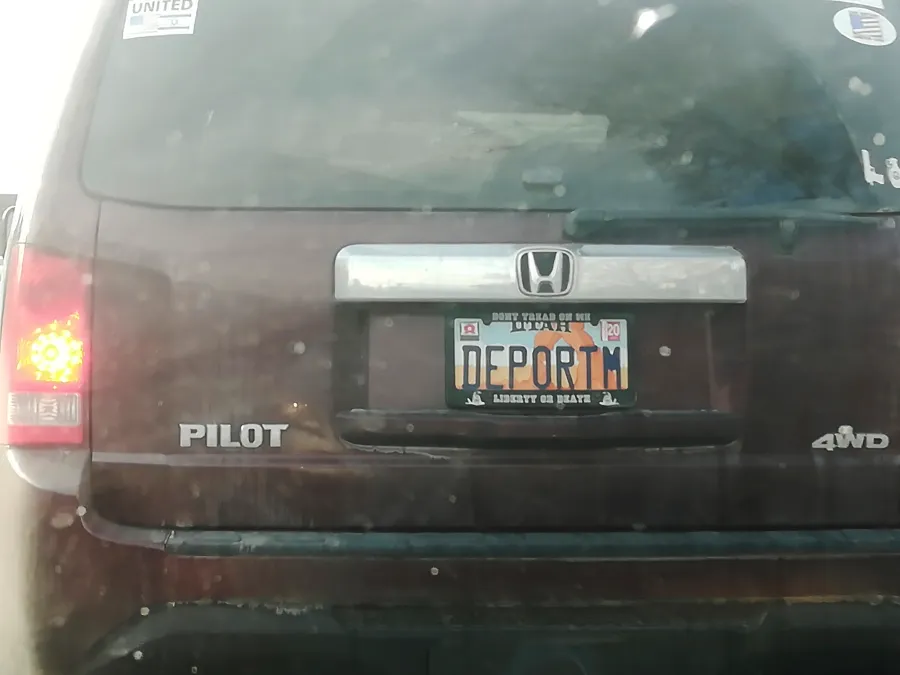Sometimes, it only takes one word—or in this case, seven letters—to shake an entire state. When Utah resident and teacher Matt Pacenza posted a photo of a license plate reading “DEPORTM”, it didn’t take long for the internet to catch fire. The cryptic yet pointed message, which many interpreted as “Deport Them,” instantly sparked public outrage, raising tough questions about hate speech, free expression, and how state agencies regulate personalized license plates.
So, how did this get approved in the first place? And what does it mean for the future of free speech on state-issued materials? Let’s dive in.

The Social Media Firestorm That Started It All
It started with a single tweet—but it didn’t stay quiet for long.
Pacenza’s post questioning the plate’s approval went viral, and thousands of users weighed in. Many were shocked that such a message had made it onto an official Utah license plate, especially given the clear implications of xenophobia. The backlash was swift and intense, with activists, residents, and civil rights organizations calling out the plate as offensive, discriminatory, and unacceptable in a modern, inclusive society.
Online forums lit up. Community groups held emergency meetings. The conversation quickly shifted from how did this happen? to how do we fix it?
Video: Confederate license plate sparks controversy
Public Response: Civil Rights Groups and Communities Speak Out
The reaction wasn’t limited to angry tweets. Prominent civil rights groups, including the ACLU of Utah, joined the conversation, releasing statements condemning the license plate. They argued that such public messaging, especially on government-issued materials, not only spreads hate but also validates it through perceived state endorsement.
Local residents echoed those sentiments. In community meetings across Utah, the message was clear: public symbols matter, and state-sanctioned materials must reflect values of unity, not division.
DMV Under Fire: How Was “DEPORTM” Even Approved?
Here’s where things get complicated.
According to the Utah Department of Motor Vehicles, the “DEPORTM” plate was approved back in 2015. But here’s the kicker—they already had guidelines in place prohibiting messages considered derogatory or inflammatory. So… what went wrong?
That question has sparked a broader concern about oversight and transparency. Critics argue that the current review process is inconsistent, possibly outdated, and lacking in cultural awareness. Others have suggested that without a robust vetting system, offensive messages can (and clearly do) slip through the cracks.
This incident has exposed a serious flaw: the people tasked with filtering license plate applications may not have the tools—or training—to fully understand how certain messages land in today’s climate.
Bipartisan Political Backlash: Rare Unity for Accountability

In a surprising show of unity, both Republican and Democratic lawmakers in Utah expressed outrage over the plate’s existence.
Senator Daniel Thatcher (R) and Senator Luz Escamilla (D) both released strong statements condemning the plate and calling for an overhaul of the DMV’s screening process. Their bipartisan stance underscored a shared understanding: public messaging must be handled with care, regardless of political affiliation.
More than just talk, both senators are now proposing legislative reforms to tighten license plate reviews, increase transparency, and ensure no state-issued materials spread hate or discrimination.
A Deeper Dive into the SSSS Debate: Free Speech vs. Public Decency
Of course, not everyone agrees on where the line should be drawn.
Supporters of unfiltered free speech argue that license plates are personal expressions, and any effort to restrict them borders on censorship. But critics point out that vanity plates aren’t private property—they’re state-issued and therefore carry an implicit endorsement from the government.
This isn’t just a legal debate—it’s a cultural one. What happens when personal views collide with public values? Where does free speech end and state responsibility begin?
Utah’s Internal Investigation and What Comes Next
Video: Should personalised number plates be banned?
The Utah Tax Commission has since launched an internal review of the license plate approval system. Their goal? Figure out exactly how “DEPORTM” got approved, and ensure nothing similar slips through again.
Officials have also promised to revise the application review process, incorporating new checks and safeguards. And while this may take time, it’s a promising first step toward rebuilding public trust.
Observers nationwide are watching closely. If Utah’s reforms prove effective, other states may follow suit, creating a national movement to clean up vanity plate policies and prevent similar controversies elsewhere.
This Isn’t Just a Utah Problem—It’s a National One
Believe it or not, this isn’t the first time a vanity plate has stirred public outrage.
From California to Florida, states have dealt with backlash over license plates perceived as racist, sexist, or politically charged. And in nearly every case, public pressure—not internal policy—forced the change.
That’s why reform advocates are now pushing for federal-level guidelines or at least a set of best practices that every DMV can follow. The aim is simple: prevent hate, protect expression, and reflect the values of the diverse communities these states serve.
The Power of Public Symbols: Why Plates Matter More Than We Think

Some people might say, “It’s just a license plate—what’s the big deal?”
But symbols matter. They shape perception, influence conversation, and reflect the values a society chooses to amplify. A state-issued plate isn’t just a random expression—it’s a traveling billboard with government approval.
So when a message like “DEPORTM” is allowed to circulate for nearly a decade, it sends a dangerous signal about what is—and isn’t—acceptable in public discourse.
Conclusion: One Plate, A Bigger Problem, And A Chance to Do Better
The “DEPORTM” plate may seem like a single mistake, but its impact is far greater. It exposed gaps in policy, ignited a cultural debate, and challenged state institutions to reflect on what they allow in public spaces.
More importantly, it proved that public outrage—when focused and unified—can spark real change.
Now, as Utah moves to clean up its licensing process, we’re reminded that small things like license plates can carry big weight. And if we want to build a more inclusive, respectful society, we need to start by fixing the small things—one plate at a time


